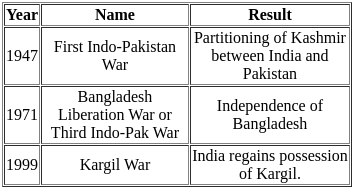Political Science: CUET Mock Test - 7 - CUET MCQ
30 Questions MCQ Test - Political Science: CUET Mock Test - 7
How many continents does the term America cover?
The nuclear non-proliferation treaty was accepted by the general Assembly of United Nations in -
BRICS is the acronym for an association of five major emerging national economies: Brazil, Russia, India, China and _______.
The 'Panchsheel Pact' was signed between Prime Minister Nehru and _______.
Tashkent Declaration followed Indo-Pak war of
The fourth meeting of the World Social Forum (WSF) was held in 2004 in:
Which of the following is not a feature of Indian Foreign Policy?
The key objective of which convention formed in 1992 was to provide an international framework within future actions could be taken to reduce the threat of global warming?
Why G20 is considered a representative forum?
What is the significance of recently concluded G20 summit?
Which of the following is the reason for the formation of G20?
Which of the following is the objective of G20
Why has India taken active interest in G20?
On June 25 1975, the proclamation of emergency was issued by:
National Emergency was imposed in 1975 on the grounds of
Under which Article of the Constitution was emergency imposed on 25 June 1975?
The Allahabad High Court gave its judgement on a petition filed by:
On 12 June 1975, Indira Gandhi's election to the Lok Sabha was declared invalid by Justice J. L. Sinha from which following High Court.
Identify the correct statements:
(A) The Cold War was a direct war between the US and USSR involving military confrontation.
(B) Both the US and USSR maintained their superpower status by developing nuclear weapons and establishing global alliances.
(C) The Cold War led to global peace and no regional conflicts.
(D) Non-alignment was a policy for countries to stay away from joining military alliances during the Cold War.
Choose the correct answer from the options below:
Identify the correct statements:
(A) The Cuban Missile Crisis was resolved with the US and USSR agreeing to avoid nuclear war and remove missiles.
(B) Non-alignment meant countries remained neutral and did not take part in global politics.
(C) The US and USSR both had nuclear weapons capable of causing unacceptable destruction, leading to a policy of deterrence.
(D) The main ideology of the Cold War was socialism and communism, which both superpowers supported.
Choose the correct answer from the options below:
Identify the correct statements:
(A) India’s non-alignment policy was criticized for being inconsistent at times.
(B) India’s non-alignment policy meant avoiding any involvement in the United Nations.
(C) Non-alignment allowed India to pursue an independent foreign policy and balance relationships with both superpowers.
(D) Non-alignment was primarily about avoiding military conflict, without addressing economic issues.
Choose the correct answer from the options below:
Which of the following statements are TRUE about US hegemony?
(A) US hegemony emerged after the collapse of the Soviet Union in 1991.
(B) The US immediately began behaving like a hegemonic power post-1991.
(C) The US has always been a hegemonic power since the end of the Cold War.
(D) US hegemony began earlier, in 1945, after World War II.
Choose the correct answer from the options below:
Which of the following statements are TRUE about the US response to the 9/11 attacks?
(A) The US immediately invaded Iraq after the attacks.
(B) The US used military power under the “Global War on Terror.”
(C) The US conducted operations in Afghanistan and Iraq in retaliation.
(D) The US focused only on diplomatic solutions to 9/11.
Choose the correct answer from the options below:
What system was set up by the US after the second world war?
As of recent years, along with the U.S., which country has a larger share of world trade than the U.S.?















